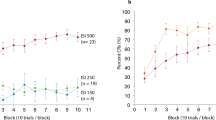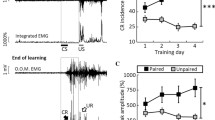Abstract
The rabbit classical eyeblink conditioning paradigm was used to assess the effects of haloperidol on hippocampal function. Haloperidol disrupted hippocampal activity and conditioned responses (CRs) at low but not high conditioned stimulus (CS) intensities. The observed relationship of hippocampal activity and the CR suggested that the hippocampus encoded sensory features associated with the learned response. Sensory processing by the hippocampus appeared to be altered by haloperidol through attenuation of the ability of a CS to evoke a learned response. Results are discussed in terms of the role of the hippocampus in sensory processing and possible mechanisms for the beneficial effects of haloperidol in schizophrenia. Classical eyeblink conditioning may provide a model system for studying behavioral and biological issues relevant to the etiology and treatment of schizophrenia.
Similar content being viewed by others
Author information
Authors and Affiliations
Additional information
Received: 11 July 1996 / Final version: 1 November 1996
Rights and permissions
About this article
Cite this article
Sears, L., Steinmetz, J. Effects of haloperidol on sensory processing in the hippocampus during classical eyeblink conditioning. Psychopharmacology 130, 254–260 (1997). https://doi.org/10.1007/s002130050237
Issue Date:
DOI: https://doi.org/10.1007/s002130050237




